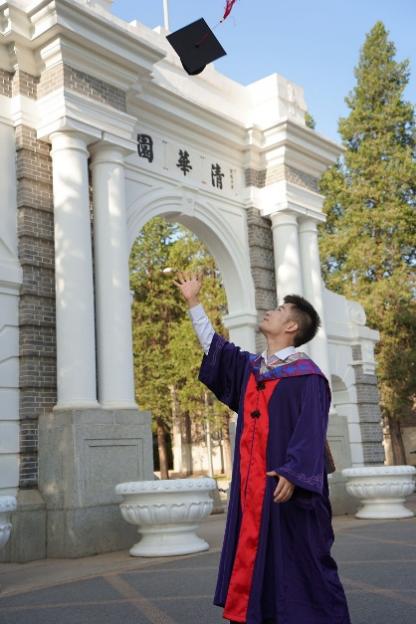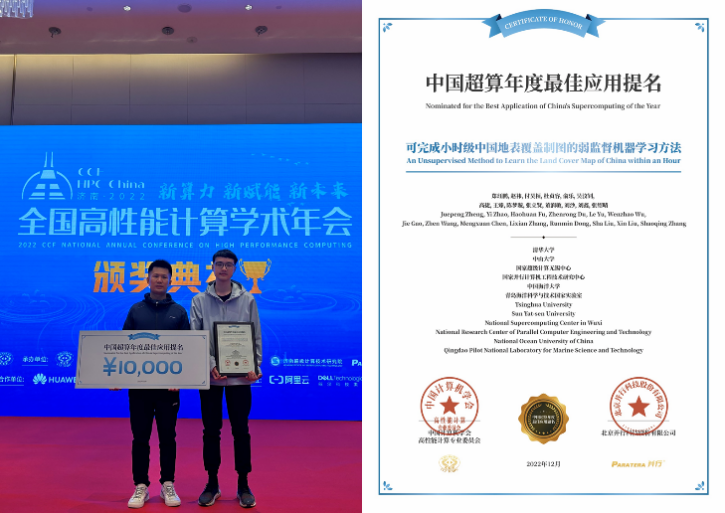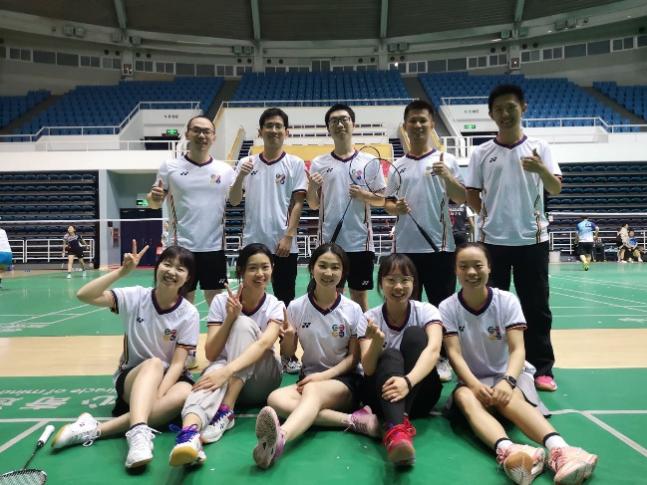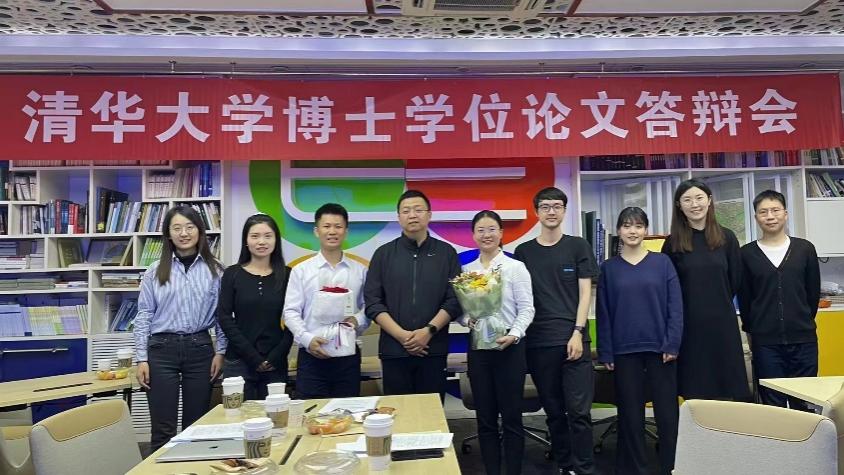
Zheng Juepeng, member of the Communist Party of China, is a Ph.D. graduate named “Excellent Graduate of Beijing” of the Department of Earth System Science (DESS) in Tsinghua University in 2023. He obtained his bachelor’s degree from the College of Surveying and Geo-informatics of Tongji University and was recommended to study in the doctoral program of the DESS under the guidance of Professor Fu Haohuan in 2019. His doctoral studies focused on the interdisciplinary research of artificial intelligence and high performance computing in the field of remote sensing science. By far, he has published 7 SCI papers as the first/correspondent author, including 6 papers rated as top 5% (Tier I) by the Chinese Academy of Sciences and 1 ESI highly cited paper. He serves as a reviewer of several SCI journals and a guest assistant editor of the special issue of Remote Sensing. He has won such honors as the nomination award for the best application of supercomputing in China in 2022, the national scholarship and the "Future Scholar" scholarship in Tsinghua University. Now he has joined the School of Artificial Intelligence, Sun Yat-sen University as an assistant professor and supervisor of master students in the "Hundred Talents Program".
Interdisciplinary Studies based on Harmony in Diversity
With a passion for interdisciplinary research, Zheng Juepeng chose to join the Research Group of High Performance Geoscience Computing of the DESS, Tsinghua University. His supervisor, Professor Fu Haohuan, always encourages students in the Research Group to fully engage in interdisciplinary studies following the concept of "harmony in diversity". The interdisciplinary characteristics of Professor Fu Haohuan's research group provided the soil for Zheng Juepeng to do relevant research. Out of his interest, he combined the academic advantages of each student to jointly tackle the project "Weak supervised machine learning method for completing hourly surface coverage mapping in China", which won the nomination award for the best application of Chinese supercomputers in 2022. Based on the new generation of Sunway supercomputer, this work proposes a highly scalable weakly supervised classification method, with which large-scale surface coverage tasks can be completed without additional manual labeling. This work is not only a daring exploration, but also the result of deep interdisciplinary investigation, combining the research methods of artificial intelligence, high-performance computing and remote sensing science. "In the past, similar work usually meant millions of dollars and year-based labeling investment, but our attempts have proved that standing on the shoulders of giants and based on our country's own supercomputer platform, we’re able to complete national-scale mapping research work within one hour,” marveled Zheng Juepeng. In his view, the current work is only a small step from 0 to 1, and there is still a research space from 1 to 10 in the future. “We should be focused on our research, proceed from more scientific problems and actual needs in the future, continue to deepen the full crossing of various disciplines, follow a route of harmony in diversity, and strive to achieve more influential research results, " said Zheng Xiaopeng.

Zheng Juepeng (left) attended the National Annual Conference on High Performance Computing and won a prize.
Technology Implementation and Practice Exchange
Zheng Juepeng always believes that scientific research should not be confined to “work behind closed doors” in the laboratory. In his view, "scientific research needs to go out and technology needs to be implemented." In addition to actively conducting academic exchanges, he also attaches great importance to practice in industry. To understand the actual needs of this field and industry and realize the integration of production, learning and research, he participated in the design of urban ventilation corridors in Xi’an and the early warning and traceability of pollutants in Yanshan Petrochemical Plant as a major participant. In the actual project implementation, he deeply understood the needs of the state, enterprises and users in related products and technologies, and made breakthrough achievements in wind field and pollutant diffusion simulation from the actual pain points. During his study in the DESS, Tsinghua University, he also actively participated in all kinds of activities in the department, striking a proper balance between work and rest. Meanwhile, communication with students from different academic backgrounds and research directions in the department gave him much inspiration in research, which helped him to make further progress in his research direction and mindset.

Zheng Juepeng (second row, second from the right) participates in the "Ma Yuehan Cup" badminton competition with other students from the DESS.
Keep Trying, Embrace Changes
Perhaps in everyone's eyes Zheng Juepeng has been smooth going all the way, but perhaps only Zheng himself knows the hardships that he has gone through. Because his research involves the deep intersection of many disciplines, scholars from different disciplines may often raise different opinions and viewpoints. Zheng has also experienced four consecutive rejections of his article, and even so, he has not given up. After constantly improving and revising the article, this work was finally accepted by Remote Sensing of Environment, No. 1 journal in the field of remote sensing. During his studies in the DESS, what impressed Zheng Juepeng most was to look up at the starry sky while standing on solid ground. He also thanked himself for not giving up or retreating, and for turning the bitterness he had suffered into a beam of light to illuminate the future. In the future, he will also become a professor and researcher, carrying the concept of "harmony in diversity" of his mentor Professor Fu Haohuan into his future career, embracing different disciplines and embracing the changes in this world.

Zheng Juepeng (third from left) took a group photo with the professors and students of the Research Group after completing the defense of his doctoral thesis.
Written by Zheng Juepeng
Edited by Wang Jiayin
Reviewed by Chen Yawei, Lu Hui and Geng Rui